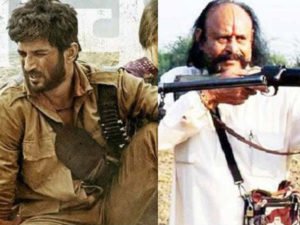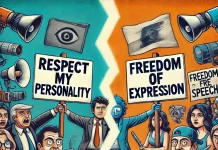Ex Bandit Malkhan Singh who had unleashed a reign of terror in the Chambal valley in 1970s has filed a petition in the Gwalior Bench of the Madhya Pradesh High Court claiming that the feature film “Sonchiraiya” which has been released which is based on his life but same has been made without seeking his permission and without his knowledge. He has further submitted that from the trailers, it appears that wrong picturization has been done.
Another similar petition has been filed by Jandel Singh, grandson of slain dacoit Mal Singh where he has claimed that the film is based on the Mal Singh gang and the makers have included a woman in the story which is not true.
The Court vide order dated March 1, 2019 directed Respondent No.s 7 to 14 (i.e. Anurag Shrivastava (CEO- CBFC), Abhishek Chaubey (director), Ronnie Screwvala-RSVP Productions and actors- Sushant Singh Rajput, Ashutosh Rana, Manoj Bajpayee, Bhoomi Pednekar and Ranveer Shorey, to bring the original DVD of the film so that the joint screening of the film for the petitioner and the respondents can be organized if the occasion arises. The matter is next listed on March 3, 2019. [READ ORDERS HERE AND HERE]
Malkhan Singh has amassed 94 cases, including 17 cases of murder, 19 cases of attempt to murder, 28 cases of kidnapping and 18 cases of robbery by the time he surrendered before the former Madhya Pradesh chief minister Arjun Singh in 1982.
As per reports, Malkhan Singh has also claimed that the script of the movie has been taken from his biography, ‘Malkhan — The Story of Bandit King’. Malkhan Singh who is the grandson of dreaded Chambal dacoit Mal Singh who was killed by Gurkha troops in the valley in 1955, has also contended that his grandfather was projected wrongly in the movie. Man Singh, born into a Rajput family, was credited with 1112 robberies and 185 murders including 32 police officers.
Some similar cases:
- In Sahara One Media and Entertainment & Ors vs Sampat Pal & Ors, Plaintiff Sampat Pal had filed a suit for permanent injunction and damages at Delhi HC wherein she claimed that she is a social activist and runs an organization in the name and style of “Gulabi Gang”. Also, her gang is called as Pink Gang too as they wear Pink Sarees and carry a wield bamboo stick. The aim of the organization is the uplifitment of rural women and taking measures to redress any injustice against vulnerable and illiterate woman residing in remote parts of the country. The suit was filed to restrain Sahara One Media & Entertainment & Ors for releasing the film “Gulaab Gang” which she claimed was an adaption of her life story into a movie. She claimed that the portrayal of the characters in the film defamed her and degraded her along with the others members of the organization. She further alleged that the film defames her and portrays her work in bad light and in a horrific manner with swords and sickles. The Single bench of the Delhi High Court passed an order restraining the film’s release until the next date of hearing from broadcasting, distributing and promoting the film “Gulaab Gang” in its censored or uncensored prints. Thereafter the Producers i.e. Sahara One Media & Entertainment & Ors appealed before the Division Bench of the Delhi High Court. The Division Bench of the Delhi High Court allowed the release of the film with a condition in the Disclaimer that Sahara Media and Entertainment can show the film by stating that he has nothing whatsoever to do with the life and works of Sampat Lal and her organization.
- Phoolan Devi Vs.Shekhar Kapoor and Ors: The suit was filed to restrain the defendants from exhibiting publicly or privately ,selling, entering into film festivals, promoting, advertising, producing in any format or medium, wholly or partially, the film “Bandit Queen” in India or elsewhere. The Delhi High Court injuncted the defendants from exhibiting the film as produced by them and found the film to be violating the privacy of plaintiff’s body and person. The Court held that right to privacy is implicit in the right to life and property guaranteed to the citizens of this country by Article 21 of the Constitution, consent and public record being exception in contravening the right to privacy. They further held that if defendants are allowed to exhibit the film further it would cause further injury to the plaintiff. No amount of money can compensate the indignities, torture, feeling of guilt and shame which has been ascribed to the plaintiff in the film. The matter was eventually settled between the parties.
- Akshaya Creations v/s Muthulakshmi- Muthulakshmi wife of late Veerappan filed a suit for the relief of injunction, restraining the defendants from in any manner, exhibiting, releasing or exploiting the film named “Vana Udham” in Tamil and “Attakasa” in Kannada or in any other name, in any other language, portraying her life and the life of her husband, late Veerappan, in any form. The City Civil Court Chennai passed an order granting injunction restraining the defendants, from exhibiting, releasing or exploiting the aforesaid two films and also restrained the defendants from publishing any advertisement or giving interviews in daily newspapers, T.V. Channels or in any other media, in respect of the said films. In an appeal filed by the producers before the Madras High Court, the court relied on the Supreme Court decisions in (i) R. Rajagopal and Anr vs State of Tamil Nadu [1994 (6) SCC 632] in which the Supreme Court had clarified that though every citizen had right to privacy under Article 21 of the Constitution, any information based on public records could be published by the press. The Court also made it clear that the State and its officials did not have any privacy rights (ii) R.Rajagopal & Anr. v. Jayalalitha & Sasikala[ (2006) 2 CTC 35] wherein the Court had held that public personalities cannot expect the same degree of privacy as ordinary people (iii) C.B.F.C. v. Yadavalaya Films [2007 (1) CTC 1] wherein the Court set aside the objections of the Censor Board and allowed the release of the film depicting the assassination of Rajiv Gandhi. Relying on these judgments and since the petitioner agreed to delete the marriage scenes between Veerapan and his wife (Respondent), the court concluded as under: “Therefore, having regard to the law laid down by the Hon’ble Supreme Court in the aforesaid judgment, and having regard to the undertaking given by the learned Senior Counsel for the revision petitioners, that the revision petitioners would delete those scenes, as stated above, I am of the opinion that the right of privacy of the first respondent is in no way affected and there is no right of privacy available to the first respondent, as the Film is taken on the basis of the Police records and the first respondent has no cause of action, restraining the revision petitioners from exhibiting, exploiting the said Film.” Ms. Muthulakshmi thereafter filed a special leave petition before the Supreme Court against the Madras High Court order. However the matter was ultimately compromised between the parties.
There are several other cases (which can be viewed in the Judgement section here) where cases have been filed by legal heirs of personalities on whose lives films have been made. In most cases, courts have permitted these films to be released with adequate disclaimers. Where films are based on public records, courts have held that there cannot be any breach of privacy rights with respect to materials obtained from public records.
In the right to privacy judgement i.e. Justice K.S Puttaswamy (Retd.) V. Union of India and ors, the Supreme Court had held that “Every individual should have a right to be able to exercise control over his/her own life and image as portrayed to the world and to control commercial use of his/her identity. This also means that an individual may be permitted to prevent others from using his image, name and other aspects of his/her personal life and identity for commercial purposes without his/her consent.”
It would be interesting to see whether in the Sonchiraiya case, the court upholds the right to privacy of the petitioner.
Image source: here












